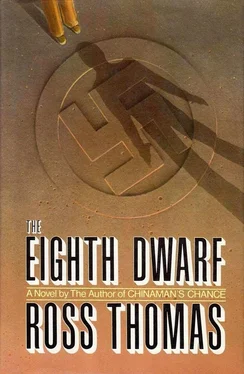Past the door, they found themselves in an immense, round room with stone walls and a wide stone staircase that hugged the curving wall as it descended into the dining area thirty feet below. The place was lighted by a number of kerosene lamps and what Jackson estimated to be hundreds of thick, squat candles.
At the bottom of the stairs they were met by a bowing, properly obsequious headwaiter dressed in white tie and tailcoat, who showed them to a table, took their coats, and handed them their menus. Before examining the bill of fare, Jackson looked around at the the other diners.
Most of them were Germans: prosperous, flush-faced men in their forties and fifties. Nearly all of them were accompanied by much younger women who seemed to be eating hungrily. There were also a number of middle-ranking American Army officers: majors and lieutenant colonels mostly, with a sprinkling of captains. The Americans’ women, for the most part, seemed better looking, better dressed, and not quite so hungry. On a small raised platform a four-piece string ensemble played moody waltzes. A few couples danced.
The shock that Jackson got when he examined the menu almost cost him his appetite. The prices were higher than New York’s highest, higher even than the astronomical black-market prices he had paid, in Paris during the week’s leave he had had there in ’45 just before they had flown him out to Burma. He guessed that it was going to cost him 10,000 marks to get out of the Blue Fox Cellar. Ten thousand marks was about fifty American dollars.
Leah Oppenheimer smiled shyly and asked if he would mind ordering for her. Since the menu was written in bad French and boasted caviar and champagne, he ordered both plus coq au vin, a salad, and a Moselle, which the menu claimed to be prewar. He ordered in French, and the German waiter replied in English.
Although the caviar was a bit suspicious and the champagne equally so, the chicken was good, as was the Moselle. Leah Oppenheimer ate and drank everything that was set before her. Afterward, she said that she really didn’t care for a dessert, but wouldn’t mind the coffee and brandy that Jackson proposed instead.
The brandy made her bold, or perhaps just less reserved. With her elbow on the table and her chin cupped in her hand, she gazed at Jackson and said, “You have done this many times, haven’t you?”
“Well, not exactly like this,” he said, thinking of the bill that was yet to come. “This is rather special.”
“I think you have had much experience with many women.”
Jackson could think of nothing to say to that, so he smiled and hoped that it was a noncommittal smile and not a leer.
“But you have never married.”
“No.”
“Do you think you will one day?”
“I’m beginning to wonder.”
“I think you will marry a nice American girl and settle down and live in — in Tulsa, Oklahoma.”
Jackson realized that for her Tulsa was as remote as Timbuktu. Perhaps even more so. “I think you’re a lousy fortune-teller,” he said.
“When I was young, I thought that I would like to get married someday,” she said. “But now, of course, I’m too old.”
“You are pretty old, all right — at least twenty-seven or twenty-eight,” he said, slicing at least a year from her age because he thought it might make her feel better.
“That is old for a European,” she said, and sighed — somewhat dramatically, Jackson thought. He also wondered if she had gone back to reading from her awful script again.
“My friend, Fräulein Scheel,” she said, and paused.
“What about her?”
“She is both very fortunate and very foolish, I think.”
“Why?”
“There is this very nice young American — but you know him, don’t you: Lieutenant Meyer?”
“We’ve met.”
“That’s right; of course. Well, she has allowed him to think that she will marry him, but she has no intention of doing so.”
“What’s the matter — doesn’t she care for Milwaukee?”
“She says he is far too callow a youth.”
She’s reading from the script again, Jackson decided. “Did she say callow?”
They had been speaking English, and Leah Oppenheimer blushed slightly as though embarrassed. “Is that not the correct word — callow? In German it is ungefiedert .”
“It’s the correct word all right. It’s just that Lieutenant Meyer didn’t seem all that ungefiedert to me.”
“Eva has always liked older men,” she said, turning almost confidential. “Even when we were young girls together, she was a terrible flirt. The Scheel family was quite well-to-do before the war, you know, and they had many visitors, and Eva was always flirting with the men, even the ones who were old enough to be her father. I think she misses it.”
“What? The men?”
“No, being well-to-do. I think that finding herself in reduced circumstances is very difficult for Eva.” Jackson by now was almost beginning to believe that there really was a script and that it had been written for her by a Victorian novelist. A lady novelist.
“Didn’t you do any flirting when you and Fräulein Scheel were younger?”
She seemed almost shocked by the suggestion. “Oh, no. I was far too shy.”
“What about later, when you were in Switzerland? There must have been some boys around.”
“But not many Jewish boys, Mr. Jackson. By then, I suppose, there were not too many Jewish boys around anyplace in Europe.”
That was a topic that Jackson had no desire to pursue, so instead he asked her to dance.
That idea also seemed to shock her. “I have not danced since school in Switzerland, and then it was only with other girls.”
“It’s like swimming or riding a bicycle. Once you learn, you never forget.” He wasn’t at all sure that this was true, but he felt that it was probably encouraging.
“I would be awkward.”
“I’m a strong leader.”
“Well,” she said hesitantly, “if you don’t think I—”
“You’ll do fine,” he said.
The string ensemble was playing “As Time Goes By” with a rather methodical Teutonic beat, and at first she was a little stiff. But then she gained confidence, and when she did she allowed herself to relax and move in closer. Jackson decided to find out how she would enjoy dancing cheek to cheek. When she made no move to draw away and even pressed in closer to him, he gave serious consideration for the first time to the possibility of taking her to bed. A little later, when her thigh began to move between his legs, he knew that he would.
She was, Jackson had discovered, remarkable in bed. He lay there in the twisted down comforter, spent and still panting slightly, waiting for his breathing to return to normal so that he could light a cigarette. While he waited, he reviewed the three-quarters of an hour of grappling, probing, tasting, touching, and other rather complicated acrobatics that had gone into their lovemaking.
Leah Oppenheimer sat up in the bed, bent over, and found his shirt on the floor where it had been hastily discarded in a puddle of clothing. She took cigarettes and matches from its pocket, lit one, and handed it to him. He noticed that her face and eyes seemed to be glowing.
“Thanks,” he said.
She watched him smoke for a moment and then said, “So that is lovemaking?”
“That’s it. I can’t think of anything we left out.”
“That was my first time. I’m very glad that it was with you.”
“Uh-huh.”
“Was I adequate?”
“You weren’t adequate, you were fantastic.”
“Really?” She seemed pleased.
“Really.”
“I was worried that... well, you understand.”
“Sure.”
“You know when I decided that I would do this if you asked me?”
Читать дальше












